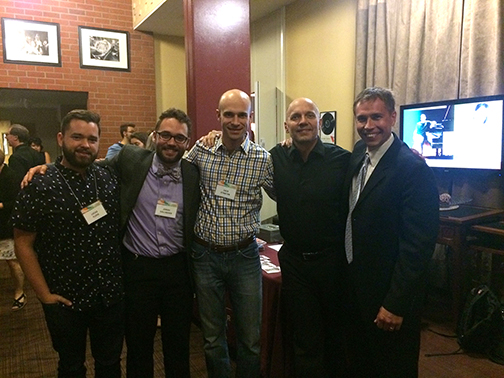
Paul Barnes’ new project began last Fall when he was booked to be the convention artist for The Christian Fellowship of Art Music Composers national festival (CFAMC) in Los Angeles.
“They wanted me to do a solo recital featuring members of this group,” said Barnes, the Marguerite Scribante Professor of Piano in the Glenn Korff School of Music.
He chose four pieces from among around 25 scores he was given to select from, including works by Jonah Gallagher (b. 1993), Lucas Floyd (b. 1988), Zack Stanton (b. 1983), Jason Bahr (b. 1972). His program there also included works by Philip Glass (b.1937), Joan Tower (b. 1938) and Victoria Bond (b. 1945). Including himself (b. 1961), he noticed something interesting.
“In this recital, I have someone in their 20s, 30s, 40s, 50s, 60s and 70s,” Barnes said. “I had a composer writing through every generation.”
And thus, the title “New Generations” was born. Gallagher was just a sophomore at Biola University when Barnes selected to play his piece last Fall.
“He was the youngest composer I had every programmed in my life,” Barnes said. “I realized this program I was doing had this interesting generational span, where I had this 21-year-old kid all the way up to Victoria Bond, Philip Glass and Joan Tower, who are in their 70s.”
He has since performed “New Generations” in Detroit and Portland and performed it March 24 at Seoul National University, where he is also lecturing and teaching masterclasses. His trip also includes performances of his Liszt and the Cross lecture-recital, including his first performance in Taiwan at Tunghai University on March 26.
“I have so many friends in South Korea, so I will also be doing masterclasses at various other schools,” Barnes said.
In May, Barnes will record “New Generations” in Kimball Hall for release on a CD by Albany Records. He has received support from the Hixson-Lied Endowment and the Glenn Korff School of Music for the recording.
“I promised Albany I’d get the master recordings to them by June 1, so they can have the physical CD’s produced by Sept. 1,” Barnes said. “Which means I can take them with me on all these tours the following year.”
He plans to perform in Portland, Seattle, Los Angeles, Chicago with tours of Ohio and Florida and will perform “New Generations” in Lincoln sometime next year.
“It will be a very busy three days of recording because I have a lot of repertoire,” Barnes said. “It just absolutely spans the emotional gamut. I’m very excited about it.”
The CD will include new versions of Barnes’ transcriptions of Glass’s Orphee and the Princess, Satyagraha and Monsters of Grace, as well as Barnes’ new transcription of Tower’s “Homage to Beethoven,” which he performed last Fall in Kimball.
Other works on the CD will include Ivan Moody’s “Fiorature,” Lincoln Hanks’ “Monstre Sacre,” Gallagher’s “Ad Infinitum,” Floyd’s “Piano Thoughts,” Bahr’s “Five Preludes” and Stanton’s “Scenic Route.”
“Each piece is just an incredibly different musical impression,” Barnes said.
On April 20, Barnes will be performing in New York City at Bond’s Cutting Edge Concerts New Music Festival in Symphony Space. There, he will perform Floyd’s “Piano Thoughts I and II,” Bahr’s “Five Preludes” and Stanton’s “Scenic Route.” It will be the world premiere of “Piano Thoughts II.”
“The great thing about this series is that the composer is required to be present,” Barnes said. “So Jason will be flying up from Florida, Zach will be flying from Iowa and Lucas will come from San Francisco, and we’ll all be converging on the other side of the country.”
Barnes is excited about bringing this new repertoire to more people.
“My job is working with young musicians, and it’s my job to inspire them,” he said. “When they realize there are young composers writing music that is so exciting and is really fun to play, then it gets them involved in that creative aspect.”
He noted the response he received at the concert in Los Angeles last year.
“The recital I gave in Los Angeles got a standing ovation, and nobody in the audience had heard one note of any of this music before,” he said. “That to me is a huge sign that there’s hope for the future of classical music. If it all goes well, it can really move and touch people and get them really excited. That means there is a future for what we do, so that’s really important.”
To view Barnes perform Bahr’s “White Hall Prelude,” visit http://go.unl.edu/barnes. To see him perform Tower’s “Homage to Beethoven,” visit http://go.unl.edu/barnes2.